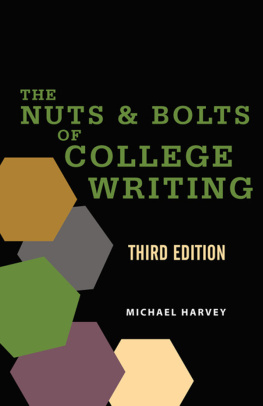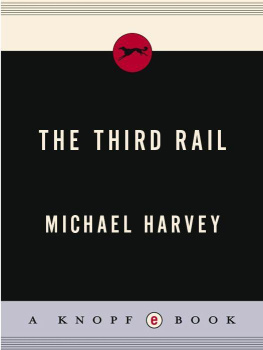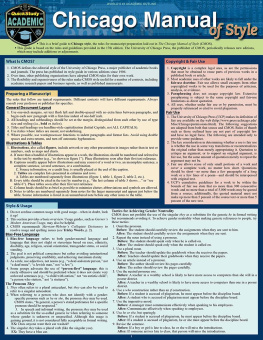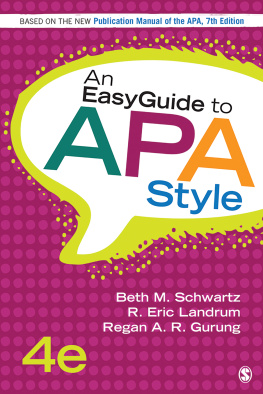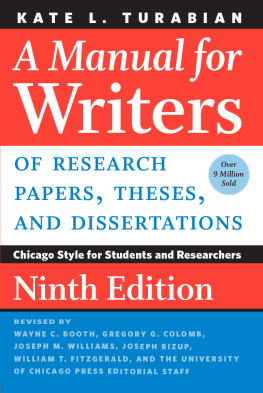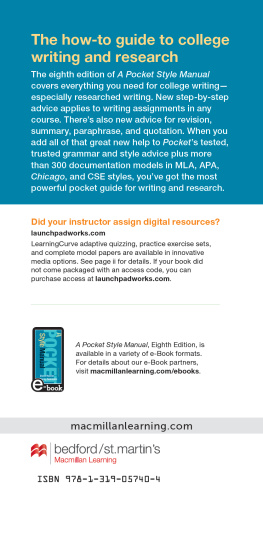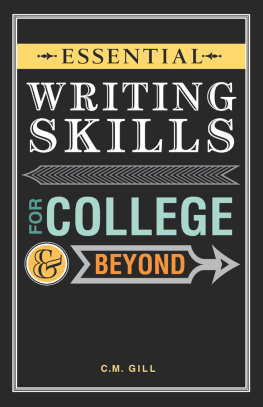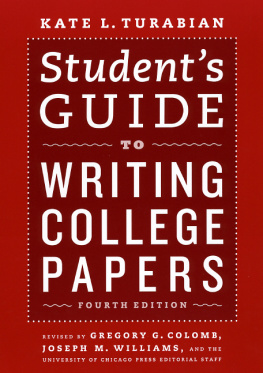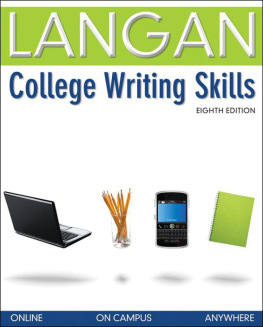Contents
Guide
The
Nuts & Bolts
of College
Writing
Third Edition
The
Nuts & Bolts
of College
Writing
Third Edition
Michael Harvey
Hackett Publishing Company, Inc.
Indianapolis/Cambridge
Copyright 2020 by Hackett Publishing Company, Inc.
All rights reserved
Printed in the United States of America
23 22 21 20 1 2 3 4 5 6 7
For further information, please address
Hackett Publishing Company, Inc.
P.O. Box 44937
Indianapolis, Indiana 46244-0937
www.hackettpublishing.com
Composition by Integrated Composition Systems
Library of Congress Control Number: 2020934811
ISBN-13: 978-1-62466-919-4 (cloth)
ISBN-13: 978-1-62466-859-3 (pbk.)
The paper used in this publication meets the minimum requirements of American National Standard for Information SciencesPermanence of Paper for Printed Library Materials, ANSI Z39.481984.

ePub3 ISBN: 978-1-62466-949-1
Anthony Weston, A Rulebook for Arguments, Fifth Edition.
Gordon Harvey, Writing with Sources: A Guide for Students, Third Edition.
Stanley Chodorow, Writing a Successful Research Paper: A Simple Approach.
David R. Morrow, Giving Reasons: An Extremely Short Introduction to Critical Thinking.
George Pullman, Writing Online: Rhetoric for the Digital Age.
For George Orwell,
who matters more than ever
There was a sociologist who had written a paper for us all to readsomething he had written ahead of time. I started to read the damn thing, and my eyes were coming out: I couldnt make head nor tail of it! I figured it was because I hadnt read any of the books on [the conference] list. I had this uneasy feeling of Im not adequate, until finally I said to myself, Im gonna stop, and read one sentence slowly, so I can figure out what the hell it means.
So I stoppedat randomand read the next sentence very carefully. I cant remember it precisely, but it was very close to this: The individual member of the social community often receives his information via visual, symbolic channels. I went back and forth over it, and translated. You know what it means? People read.
Then I went over the next sentence, and I realized that I could translate that one also. Then it became a kind of empty business: Sometimes people read; sometimes people listen to the radio, and so on, but written in such a fancy way that I couldnt understand it at first, and when I finally deciphered it, there was nothing to it.
Nobel Prizewinning physicist Richard Feynman, Surely Youre Joking, Mr. Feynman!: Adventures of a Curious Character (1985)
Modern English, especially written English, is full of bad habits which spread by imitation and which can be avoided if one is willing to take the necessary trouble. If one gets rid of these habits one can think more clearly.
George Orwell, Politics and the English Language (1946)
You dont start out writing good stuff. You start out writing crap and thinking its good stuff, and then gradually you get better at it.
Octavia E. Butler, interview, Locus Magazine (2000)
A word after a word after a word is power.
Margaret Atwood, Spelling (1981)
{ix}
EXPECTATIONS ABOUT WRITING college essays have changed since the first edition of this book was published seventeen years ago. Today there is much more attention to issues of correctnessthat is to say, to using non-offensive and inclusive language to refer to people (and other beings). Identifiers of race, nationality, ethnicity, sexuality, age, religion, ability, and morebut gender in particularhave become a tangle of rules, expectations, and opportunities for advocacy or offense for writers and readers. If one is writing about menstruation, for instance, the term people with periods now presents itself as an inclusive substitute for the word that once would have been automatically used for those who experience it, women. It is easy to deride such innovations, but it is also easy to see their logicality and even aptness: As our understanding of identity expands, should not our language expand as well?
In many ways this is exciting and serves as an invitation to ponder the power of words to obscure or to reveal, to harm or to help, and to shape our very thoughts. Language, both spoken and written, has always been a battleground pitting new ideas, values, and experiments against the hard-won judgments and lessons of the past. Contesting particular words has always been a part of the battle. And claims of correctness are always ideological, whoever makes them. Now to term something ideological is not in and of itself a criticismbut it does suggest that part of our job as writers and readers is to be attuned to this non-neutral aspect of the words we and others choose. As the unapologetically politicalbut always independent-mindedEnglish writer George Orwell, to whom this book is dedicated, said, The more one is conscious of ones political bias, the more chance one has of acting politically without sacrificing ones aesthetic and intellectual integrity (1956, 394).
{x} This book is meant to help you write college essays with both effectiveness and integrity. Its advice on correctness is to think fairly, to write clearlyand prudently to ask your teachers what set of conventions they expect you to follow. Once you are past us well-meaning custodians of correctness, you will have more freedom. Of course it will not come as a surprise that your freedom will then be challenged by a world with its own demands and exhortations about how you should write and what words you must or must not useand that the particulars will change according to time, place, and fashion.
Even in that wider world, however, it is my hope that the chief lesson of this bookto be clear in your writing about who does whatwill prove its lasting worth. Society evolves, technology advances, and human potential increases: but the human condition persists. We live as our species has always lived: born in tears, learning hard lessons about the difficulty of communication and the fragility of cooperation, and struggling to understand and be understood. In the course of our lives all of us, for better or worse, will face countless choices with significant moral consequences. Anyone who writes expository essays about life and striving is telling a story about actions and choices. The best (most effective and most moral) way to do this will always be a baseline style of active voice and strong verbs that helps clarify who has done what, to whom, with what consequence. This is not meant to restrict your creativityplease, feel free to experiment and play with words all you wantthats part of the joy of language! But it is meant to alert you to the basic moral responsibility of good expository writing: it should reveal, not obscure. At least, thats my advice. In the end, its your choice.
. With regard to animals, see the inaugural editorial in the Journal of Animal Ethics, which advises contributors to the journal to avoid the term pets as patronizing and ethically misleading, and suggests the term companion animals as its replacement (Terms of Discourse, Journal of Animal Ethics, vol. 1, no. 1, Spring 2011, pp. viiix).
{xi}
THIS BOOK CAN help you write better college essays. It combines the most important rules and conventions of academic writing with the rudiments of good style. Naturally it has its limitations: it is general (with little to say about writing in different disciplines), basic (and may be most useful to beginning college students), and short (thus covering a lot of ground quickly). It is not about critical thinking in any formal sense, and indeed tries to lay down its dos and donts, as well as my own unauthorized views on writing, as informally as possible. These views, personal and perhaps even idiosyncratic, may be its biggest limitation. Yet writing is an intensely personal activity. It seems only right, even necessary, that writing advice have a personal touch as well.

